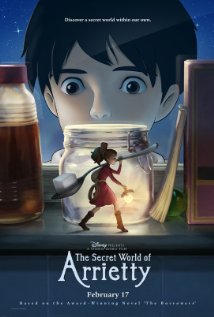
 Heard on the radio last Friday:
Heard on the radio last Friday:
Radio Host: “The Secret World of Arrietty is opening this weekend. I wish I still had a small child. I’d really like to see it.”
Co-Host: “Yeah. I know a guy who likes to borrow his nephew so that he can go to movies like that.”
This exchange goes a long way to explain what is wrong with animation in America today. Is it surprising that all the good animation seems to come from countries where adults are allowed to watch animated movies without being accompanied by a small child, or indeed where studios are allowed to make animated movies that aren’t aimed at children?
I’m going to go out on a limb and suggest that you break the rules and see The Secret World of Arrietty anyway. It may well be the best choice in the theaters at the moment, animated or live-action, at least if you’ve already seen The Artist.
(In spite of the talk about “small children” I would recommend this only for audiences who are school-age and up. Some of the material is likely to be disturbing to preschoolers.)
This is of course is Studio Ghibli’s Kari-gurashi no Arietti but I am confining this review to the English-dubbed version released by Disney and currently being shown in American theaters. When the DVD is released I may do another review of that. To summarize: this is a Disney-dubbed version of a Japanese anime film from Studio Ghibli, currently the world’s best animation studio. It was produced and co-written by the renowned Hayao Miyazaki and directed by his protege Hiromasa Yonebayashi. It is a fairly loose adaptation of Mary Norton’s 1952 novel The Borrowers.
The animation is about what you would expect from Studio Ghibli: beautiful and exquisitely detailed. It doesn’t break any new ground compared to other recent Ghibli films, but it is a nice example of the state of the art in hand-drawn animation.
The dub is in most respects excellent. Unlike other anime importers who tend to come up with painfully bad dubs, Disney knows how to find capable actors and (more importantly) a director who understands and respects the material. Unfortunately the dub has one serious and avoidable flaw, which I will discuss below. Most American viewer probably won’t mind it but I consider it serious enough that I am penalizing the movie 1 star.
In the story Shawn (David Henrie) a sickly boy with a heart condition, is sent to live with his Aunt Jessica (Gracle Poletti) who lives in country house that was once elegant but is now somewhat run-down. She has a slightly deranged housekeeper named Hara (Carol Burnett).
Unknowingly they share the house with three “Borrowers”, little people about 3 inches tall who live under the floorboards. These are Pod (Will Arnett) a gruff taciturn man, but wise and competent, his wife Homily (Amy Poehler) who is prone to hysteria, and their 14-year-old daughter Arrietty (Bridgit Mendler) who is brave and inquisitive.
As with most Studio Ghibli films, the girl is the main character. The movie follows Arrietty as she meets and gradually forms a friendship with Shawn, and deals with the consequences when Shawn’s well-meaning blunders cause her world to be upended.
Unfortunately the Disney dub commits a cardinal sin: it gives the characters Anglo names in the hope that dim-witted American viewers will be fooled into thinking this is an American movie. Thus Shou becomes “Shawn,” Sadako becomes “Jessica” and Haru, for reasons that are not at all clear, becomes “Hara.” (Of course anyone who is really paying attention can tell that the characters are Japanese. Americans don’t usually eat rice out of little bowls with chopsticks for breakfast.)
Some might argue that if Hayao Miyazaki moved Mary Norton’s story from early-twentieth-century England to present-day Japan, there is no reason why Disney shouldn’t move the story to America. However this misses the essential distiction between an adaptation and a translation.
When Miyazaki created Kari-gurashi no Arietti he created an entirely new work without distroying Mary Norton’s original novel. Anyone who wants to read the original novel is free to do so. On the other hand, Disney’s is the only version of Kari-gurashi no Arietti that Americans are legally allowed to watch. No one else is allowed to release a better translation.
People who enjoy a government-created monopoly have a moral if not legal obligation to follow the highest ethical standards. In this case they owe us their best efforts at a faithful translation. There is room to debate how literal a good translation should be, but changing the character’s names is an obvious act of bad faith.

